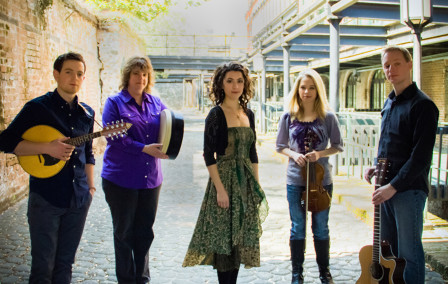RUNA Evokes the Living Tales in Celtic Songs at AMSD
RUNA breathes fresh life into traditional Celtic music by digging deep into the songs and tunes to discover the universal human thread that binds past to present. With influences ranging from bluegrass to jazz, the Philadelphia-based band delivers high-energy, stirring live performances that connect these age-old stories with emotions that continue to move and cheer contemporary audiences. RUNA consists of vocalist and step-dancer, Shannon Lambert-Ryan of Philadelphia, Dublin-born guitarist, Fionán de Barra, Cheryl Prashker of Canada on percussion; Dave Curley on mandolin, vocals, bodhrán, and step-dancing; and Tomoko Omura of Japan on the fiddle. The band often performs with world-renowned guest musicians, including Isaac Alderson on the uilleann pipes, flutes, and whistles. Members of RUNA have played with Solas, Riverdance, Slide, Clannad, Fiddlers’ Bid, Moya Brennan, Eileen Ivers, Hazel O’Conner, Full Frontal Folk, Keith & Kristyn Getty, Barcó, Téada, and the Guy Mendilow Band. RUNA will be appearing in concert at AMSDConcerts, 4650 Mansfield, on Sunday, July 14th at 7:30.
Tickets are $20 for rows 8+ and $47 for Rows 1-7 for the dinner show with your meal at DeMille’s on Adams Avenue.
Mastery and spark on fiddle, percussion, mandolin, and driving guitar meet reflective yet passionate vocals and an affectionate spirit, and invest the tales behind the music with poignant vibrancy. Two of the core and founding members of the group, Shannon Lambert-Ryan (the singer, dancer, and actor from Philadelphia, raised on Celtic and British folk sounds) and guitarist Fionán de Barra (a native of Dublin),first crossed paths at a folk festival and then, again, while collaborating on a musical project. The two fell in love, finding they still longed to be in each other’s company, despite long days in the studio. They later joined forces with percussionist, Cheryl Prashker, to form RUNA in August 2008.
With a long history of collaborating with Irish and Irish-American heavyweights, from Clannad to Eileen Ivers, RUNA’s members hail from Dublin to Louisville, but share a lively, open vision of innovation and heartfelt engagement with ballads and reels, Gaelic poetry, and bold step dancing. RUNA brings this vision that resonates on the group’s third album, “Somewhere Along the Road” – hailed by Irish Philadelphia as “an inspired group that has found its voice, and its place, in the world of Irish music.” The band won several awards at the 2010 Montgomery Buck Music Awards, including Best Entertaining Band, Best Folk Artist, Best Female Vocalist, and Best Album – “Jealousy”. They were recently recognized on an international level in the 12th Annual Independent Music Awards for Best Song in the World Traditional Category and in the Irish Music Awards with a nomination for Best Female Vocalist for 2012.
Both Lambert-Ryan and deBarra have diverse, tradition-bending pasts. de Barra went from busking on Dublin street corners and playing gritty clubs, to touring with Riverdance and acting for a decade as musical director for famed Irish traditional singer Moya Brennan. Raised by a family committed to reviving and maintaining Irish language and culture, de Barra grew up surrounded by tradition, but was never a purist; his very instrument, the guitar, got him disqualified at traditional music competitions. Lambert-Ryan, with a background in classical vocal technique and stage and film acting, had nurtured a life-long love of Celtic roots music, thanks, in part, to Philadelphia’s lively folk scene, where she first became enamored with step dancing as a young girl. As she explored her own creative path, she soon discovered that combining these loves would ultimately mold the approach for her engaging delivery of the songs.
RUNA never strays from the heart of the matter, and feels particularly strongly about the Irish language (de Barra is a native speaker). Lambert-Ryan works hard to master the meaning, intonation, and challenging but musical phonetics of Gaelic. The precision is all in service of the song, its sound, and its tale. “What makes a 400-year-old song still so important?” asks Lambert-Ryan, who answers her own query, “First and foremost it was written about human beings, and we are all similar. Our approach in RUNA is to find songs that are still powerful, still easy to relate to today.”
Their audiences feel that power, whether the show is in a cozy neighborhood club in Philadelphia or on a major festival stage, and savor their fresh, contemporary spin on cherished traditions. For tickets to RUNA, see www.AMSDConcerts.com and for sound samples of the band, see www.runamusic.com.
Category: Music








